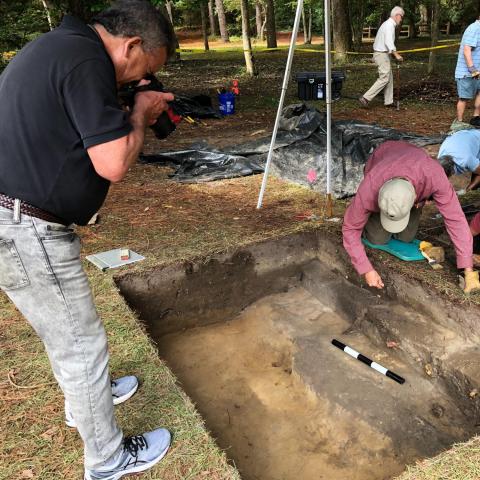
The red-throated loon is one of many species at risk from offshore oil and gas drilling/Dan Behm via American Bird Conservancy
President Trump's move to expand offshore energy development is drawing criticisms from a number of groups concerned not only over how that could impact national seashores but also marine life.
The president last week further revealed his intentions for the federal realm, ordering Interior Secretary Ryan Zinke to review the Antiquities Act and how Presidents Clinton, Bush, and Obama used it to establish national monuments, and then directing Interior officials to review their five-year Outer Continental Shelf leasing program and reconsider certain regulations pertaining to offshore energy potential.
While Secretary Zinke relished the review of the leasing program -- "I am going to lift the restrictions on American energy, and allow this wealth to pour into our communities," he said Friday -- his enthusiasm was not shared by the conservation community.
The "executive order jeopardizes the long-term future of these parks and marine sanctuaries, opening the door to potential oil spills that could do irrevocable damage to our parks, their resources, and the economies they support," said Mark Wenzler, a senior vice president at the National Parks Conservation Association. “Healthy coastal parks depend on the protection of offshore waters. The national parks that line our coasts and sanctuaries that span our oceans provide essential safeguards for our coastal parks, habitat for wildlife, and recreation opportunities that generate billions of dollars in revenues for coastal communities."

Cape Hatteras National Seashore's beaches, which draw surfers, surf casters, swimmers, and more, could be impacted by energy development along the Outer Continental Shelf/NPS
NPCA officials are concerned because the leasing program review could open up to energy development areas that have been closed to oil and gas drilling on the Outer Continental Shelf, including in the Mid-Atlantic and South Atlantic near coastal parks like Cape Hatteras National Seashore. It also calls on the Department of Commerce to refrain from designating or expanding any national marine sanctuary until it is evaluated for energy resource potential, and to review any marine sanctuaries or monuments established over the past 10 years.
“The restrictions on establishing or expanding new marine sanctuaries, coming on the heels of the president’s executive order on national monuments, is part of a disturbing trend by the administration questioning whether the protection of our natural resources should be a national priority," Mr. Wenzler said. "But these places belong to the American people who expect the administration to protect them.”
At Defenders of Wildlife, Executive Director Jamie Rappaport Clark worried about the impact on wildlife and indicated a legal battle was in the offing.
"This executive order is another effort to benefit big polluters at the expense of our natural heritage. It puts a target on marine wildlife, coastal communities, and important tourism economies exposing more of them to the prospect of development and catastrophic oil spills," she said. "There are just some messes like Deepwater Horizon and the Exxon Valdez that are too big to clean up and that have long-lasting impacts on coastal communities and marine life. The attempt to revoke President Obama’s withdrawal of certain Arctic and Atlantic waters from development is manifestly illegal.
"The Seismic testing that the executive order tries to fast-track has devastating impacts on marine life, particularly dolphins, porpoises, and whales, that use sonar to communicate and hunt for food," added Ms. Rappaport. "In a time when climate change already threatens the future of iconic species like the polar bear and walrus, vital ocean habitats and public lands in the Outer Continental Shelf should remain protected and clean energy solutions should be prioritized over the hunt for dirty fossil fuels in pristine waters."
Also criticizing the president's move was Steve Holmer, the American Bird Conservancy's vice president of policy.
"Offshore drilling and resulting oil spills and pollution would threaten numerous shorebirds on the Atlantic coast as well as in the Arctic,” he said. "Endangered species and other wildlife are being put at needless risk by this backward-looking energy policy.”
According to ABC, "Species at risk along the Atlantic coast include brown pelican, red-throated loon, roseate tern, and the black-capped petrel. The order also calls for reconsideration of the Well Control Rule put in place after the Deepwater Horizon disaster to reduce the risk of oils spills. Arctic birds could be harmed by offshore drilling as well. The recovery of spectacled and Steller’s eider, endangered species whose populations have stabilized since being listed under the Endangered Species Act, could be threatened. Other species of conservation concern found along Arctic coasts include the yellow-billed loon, spectacled eider, ivory gull, and Ross’s gull."
Members of Congress were predictably split on the president's executive order.
"Opening up our oceans to more offshore drilling further proves that Trump isn't listening to what the American people want and is instead focused on making his billionaire friends working in the oil and gas industry richer," U.S. Rep. Raul Grijalva, an Arizona Democrat, said. "If he took the time to talk to commercial and recreational fishermen, the tourism industry, elected officials from around the country he'd quickly learn that offshore drilling in the Atlantic and the Arctic is an unpopular idea. Even worse is the fact that the president wants to weaken safety regulations put in place after the BP oil spill and Shell's disastrous attempts to drill in the Arctic. This just increases the chance that coastal communities and pristine shorelines will see more of those kinds of disasters in their backyards."
U.S. Rep. Rob Bishop, a Utah Republican, meanwhile, applauded the president.
“A thorough review of the morass of bad policies developed and imposed by the prior administration to crush offshore development and investment is welcomed. I look forward to working with the Trump administration on innovative solutions to make our offshore an asset to American taxpayers, working families, private sector job creators, and our allies abroad," said Mr. Bishop, who chairs the House Natural Resources Committee.
According to NPCA, there are 88 coastal parks in the National Park System that cover more than 11,000 miles of shoreline and 2.5 million acres of oceans and Great Lakes’ waters. That represents approximately 10 percent of all U.S. shorelines and contains a diversity of lakeshores, kelp forests, glaciers, wetlands, beaches, estuaries, and coral reef areas. These parks attract more than 88 million visitors annually and generate more than $4.8 billion in economic benefits to local economies.
One example of parks depending on a marine sanctuary, noted NPCA staff, "is in South Florida at Florida Keys National Marine Sanctuary. The health of the FKNMS is directly linked to the health of adjacent protected areas, including Biscayne, Everglades, and Dry Tortugas national parks. Although under different management jurisdictions, these areas are part of the same greater ecosystem."




 Support Essential Coverage of Essential Places
Support Essential Coverage of Essential Places







Comments
Rep. Bishop probably doesn't live along the coast. And, the "reconsideration of the Well Control Rule" is folly. We've seen the havoc caused from BP's offshore disaster. I shudder to think what would happen to someplace like Padre Island National Seashore if an oil spill were to encroach upon the area. Pictures of tar-covered feathers spring up to my mind's eye quite easily, not to mention thinking about the amount of hydrocarbons that could be ingested by the sea life during an oil spill. Padre Island National Seashore is a place where 5 federally-listed threatened or endangered species of sea turtle nest. It's also a place that draws thousands of birders from all over because of the number and variety that live or migrate through there. Yes, I know there are offshore rigs already stationed outside of this national seashore, and decommissioned rigs have served as man-made reefs. But, the more rigs you have out there, the greater the chance of an accident. It's not a matter of if, but when.
Who could possibly guess that making more of these things and lessening the oversight of them might pose a problem.
https://en.wikipedia.org/wiki/Deepwater_Horizon_explosion